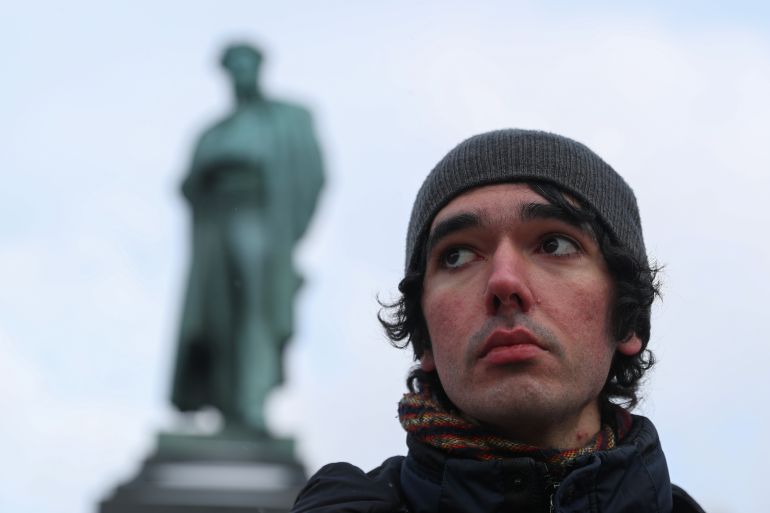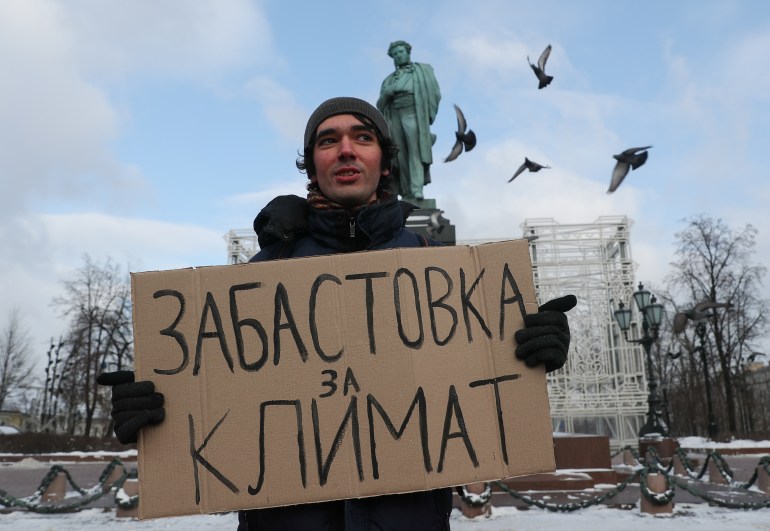Q&A: Moscow’s ‘lone climate protester’ confronts war on Ukraine
Al Jazeera speaks to Arshak Makichyan, a prominent climate activist who calls for an end to Russia’s war in Ukraine.

Arshak Makichyan, 27, is a prominent activist who has been protesting in the Russian capital for years, warning people against the dangers of climate change.
He earned the title of Moscow’s “lone climate protester” as a law in Russia bans unsanctioned protests of more than one person.
Keep reading
list of 4 itemsZaporizhzhia nuclear power plant attack: All you need to know
Russia forces seize Ukraine nuclear plant after fire is put out
China-led development bank halts business in Russia, Belarus
To be an activist in Russia, under an “authoritarian regime”, he said, was already difficult and dangerous as arrests and prosecution are common.
But now, with Russia’s full-scale invasion of Ukraine, big protests are needed to change the situation, Makichyan said.
“If you’re not an activist now, then you are part of the crime,” he said.
Al Jazeera spoke with Makichyan to find out what it is like to be a protester in Russia, and how he sees the situation in Russia changing with an all-out war being waged in Ukraine.
Al Jazeera: How did you go from a climate activist to a peace activist?
Arshak Makichyan: In 2018, I didn’t know about climate. I started to read, and I found out that there is a huge crisis, and people in Russia don’t know about it. And I felt that I should do something because it is very important. I was already concerned with different environmental issues. I was trying to change my habits and stuff like that.
But with the climate crisis, you cannot just change your habits to be more environmentally friendly, you should do something more because we need change on multiple fronts. And I then started to do weekly strikes – like [Swedish climate activist] Greta Thunberg.
Before, I was thinking to continue my education in Europe, but I decided to stay in Russia because we need activism here as well, because Russia is in fourth place for CO2 emissions. The climate crisis is a global crisis.

My strategy has been changing during the last two years. After the start of the coronavirus pandemic, I was becoming more political because there was a huge crisis and they started to prosecute a lot of my political friends. So I became more politically engaged, because you cannot fight for our future or climate without basic human rights. Now, you cannot fight for climate while your country’s involved in a terrible war.
Al Jazeera: A lot of people, certainly in the West, believe Russia is an exceptionally difficult and dangerous place to take part in protests and activism. Do you think this is true? And what problems do you face?
Makichyan: Yes, it’s completely different to be an activist in an authoritarian regime, and especially in Russia, a rich country that’s used oil money to build this huge propaganda machine and to repress civil society.
It’s extremely difficult and dangerous to be an activist in Russia. A lot of my friends were arrested and prosecuted. Even if you’re not arrested … it’s so difficult to organise protests in a country where people are afraid because they are arresting people just for writing tweets.
It’s certainly difficult and complicated. A lot of activists in Russia are thinking that they cannot continue because you don’t feel feedback because people are afraid to support you. Activists are being marginalised.
But now the situation’s starting to change because President Vladimir Putin has crossed the red line, and if you’re not an activist now, then you are part of the crime, because the war against Ukraine is a crime. And if you’re not protesting now, the situation will be worse and worse and we will lose our country.
![Police officers detain a demonstrator during a protest against Russia's invasion of Ukraine in central Saint Petersburg on February 27, 2022 [Sergei Mikhailchenko/AFP]](/wp-content/uploads/2022/02/000_32436XY.jpg?w=770&resize=770%2C513)
Al Jazeera: The war began on Thursday, February 24 – your wedding day. That must have been a shock.
Makichyan: Yes, we were shocked. We were planning this wedding for a month, because you should send the application a month before your wedding. We decided to get married because it’s a kind of security for us – you have this right to have meetings with your wife or husband if you are jailed.
We do not want to give up and leave this country even though we had tickets to Armenia already. We decided to stay in Russia to fight this insanity because people need hope. If activists are leaving the country, then people will grow more frustrated.
Al Jazeera: What are the protests like in Moscow?
Makichyan: It’s difficult to protest in Moscow now because there’s a lot of police. They’re almost everywhere. Almost all our political leaders are imprisoned now or in another country, so it’s difficult to get organised. There are difficulties, but we are holding protests almost every day in the centre. They arrested about 7,000 people during these protests in Russia.
We are thinking about what we can do because we need big protests to change the situation. There is more and more terrible news in Russia: they shut down Echo of Moscow, one of the last free radio stations. We need to do something to stop this.
Al Jazeera: What is it like dealing with the police?
Makichyan: We were arrested when we were leaving our house, they were waiting for us just outside. Polina, my wife, was planning an action, and I walked her down to the taxi. They arrested us even though we were with journalists who were going to record Polina’s action, and they arrested the cameraman.
We spent about four or five hours in the police station, talking with the police and of course, we were talking about war as well. They were saying they are just the cogs of this machine; they cannot change anything.
Al Jazeera: Will isolating Russia make it more difficult to fix problems such as global warming?
Makichyan: It’s scary for us activists to be alone in this fight because it’s not just our side. Europe was buying fossil fuels, and they were helping to build this terrible regime.
So I think that activists and civil society in Russia should not be left alone in this fight against Putin, because it’s not so easy to fight a man with millions of police. I think we need to unite to fight them. It’s frustrating to feel yourself alone in this fight.
The situation will be worse for everyone because there is no easy solution to this global crisis. But we need to stop Putin’s regime invading Ukraine. We need to stop him now because it will be late tomorrow.
We need to use every tool to change the situation in Russia because it was unbearable to be an activist before this war and now it’s even worse, because they say they’ll arrest people for spreading what they call fake news on Ukraine for 15 years. They have a new law they’re planning just against people who speak up against this war.
So now the situation is terrible, but maybe it will help us to change the terrible regime that was killing our country for 20 years. But I hope this regime will collapse soon because what Putin is doing is insane, and there will be changes in Russia before it’s too late, because I don’t want to spend 15 years in prison.
This interview was lightly edited for clarity and brevity.